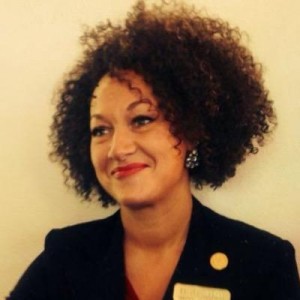There is an inconvenient truth at hand; Rachel Dolezal is a poseur.
There is a backlash to political correctness that is finally taken hold across America, and for the most part it is a healthy and much needed reaction to a stifling and crippling trend. As a society, we have become so hyper-sensitive, so “offended” and so “outraged” to anything that is being said, that nothing gets said.
We have lost our ability to laugh at ourselves and to laugh at each other. The real downside is that political correctness covers up truth, honesty and open dialog. The keepers of politically-correct thought are, of course ethically suspicious. They are so concerned with what we say, we never quite understand what they stand for; indeed, we often catch the “keepers” in their own lies.
There is an old expression that is very applicable here: “Who you are is plenty good enough.” It means, don’t apologize for who you are, be the best person you can be.
Politically correct gate-keepers have tremendous difficulty with that concept. They believe that unless you look, talk and react the way they want you to be, then you must be incapable of “understanding.”
My feeling is that if you truly strive to be a good, kind and ethical person, other people will see it. If people cannot get outside of their pre-conceived notions as to who is a good person, then that is their problem and not yours.
Rachel Dolezal is what?
Rachel Dolezal is an NAACP leader and a civil rights activist. She lives in Spokane, Washington. For many years, Rachel Dolezal has been sitting in judgment of others, making it very clear that much that is wrong in the world is the fault of white people.
In an article appearing in the Daily News (June 11, 2015) entitled: “NAACP leader Rachel Dolezal lied about being black: parents,” we learn that Rachel, a professor who teaches Africana studies at Eastern Washington University, is nothing she says she is and that she has refused to address media questions about her own background.
“Dolezal’s parents, who are both white,” states the article, “provided a birth certificate and childhood pictures of their daughter to the Coeur d’Alene Press to back up their claims she has been grossly misrepresenting herself.”
In fact, her parents produced picture that showed a young child who had straight blond hair and a light complexion and now Rachel has darker skin and very curly hair. She has an adopted black brother she has passed off as her son; she has lied about her upbringing (including the fact she claims some Native American heritage), how she lived (in a Teepee!) and claims alleged abuse that never existed. The web of lies goes on and on and not surprising, she is estranged from her parents.
To make matters worse, Rachel sits on the city’s police oversight commission. She is critical of the police toward the African-American community. She offers tips to African American viewers of movies about viewing controversial racial topics and she claims a childhood in South Africa that never happened.
The ethical damage
When we sit in judgment of others while placing ourselves on a higher ethical plane, the result can be extremely damaging, not to mention unethical. In this melting pot of the nation in which we live, which often falls short of “melting,” Rachel Dolezal is more divisive than healing. Far more honest that she embraced her European ancestry, and took up civil rights causes as a human being, than immersing herself in a masquerade of lies.
Is Rachel Dolezal an unusual case? No, not really.
Rachel is an Enron executive dictating to his accounting department about being honest; Rachel is Bernard Madoff making promises to the boards of religious charities about his ethical behavior; Rachel is Alex Rodriguez swearing to younger athletes he never took performance enhancing drugs.
In terms of politically correct behavior, Rachel presented an un-assailable set of expectations that no white person could never achieve. In Rachel’s view, anyone not black or indigenous (Native) American could not be trusted. I am sure that over time many people were thinking what a reporter finally blurted while interviewing Dolezal: “Are you white?” She stammered and sputtered.
No one had been brave enough to ask that question before for fear of being politically incorrect; no one at any charity dared ask Bernie Madoff how he (a virtuous and ethical man) could keep promising double-digit returns at the same time the economy was tanking either.
It comes down to opportunity.
The unethical will seize upon opportunities to misrepresent themselves and to take advantage of situations. They are capable of doing great damage. In their wake, they leave distrust, anger and bitterness. What Rachel could have helped heal, she divided. If only she had accepted herself as a good person!
YOUR COMMENTS ARE WELCOME!




I am appalled by what she has done.